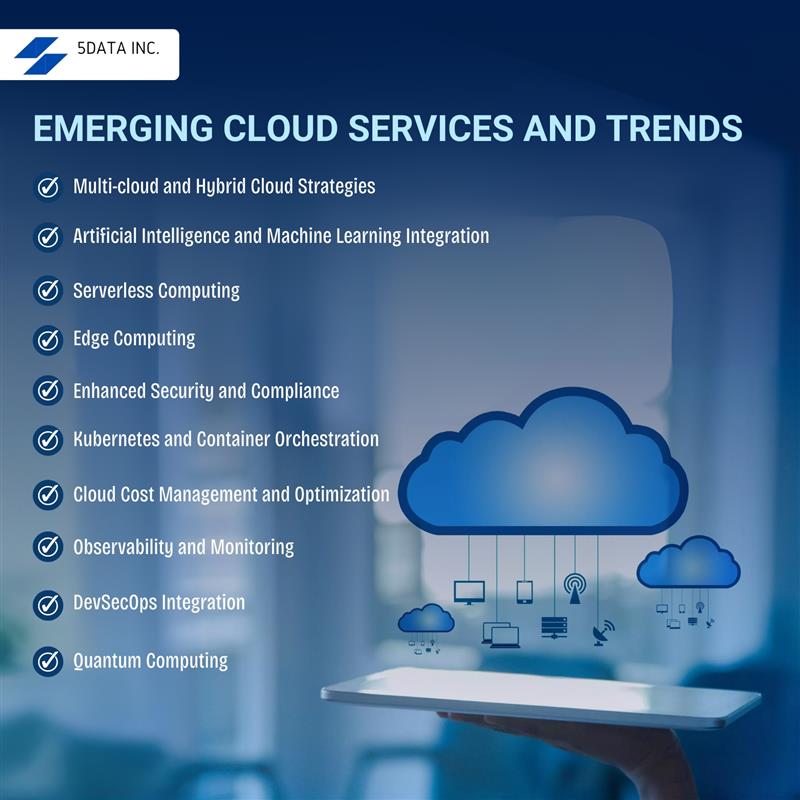Cloud computing landscape is evolving rapidly, driven by groundbreaking technologies and shifting business demands. Emerging technologies like AI, machine learning, and serverless computing can enhance your cloud operations. This blog delves into the latest trends shaping the future of cloud management, offering practical insights that can transform your approach to cloud operations.
Explore the rise of multi-cloud and hybrid cloud strategies and understand the critical role of security and compliance in the modern cloud environment. Gain insights into optimizing cloud costs, enhancing performance, and preparing your organization for the next wave of cloud innovation.
Key Takeaways
- Cloud computing trends are revolutionizing market dynamics and business operations through innovative and integrative capabilities.
- Cloud management has established the ease of access to various software applications.
- With its integration into artificial intelligence, machine learning, the Internet of Things, and DevOps, cloud management has stabilized business continuity and effectively managed costs.
Impact Of Cloud On Businesses
If one has to discuss growth in business systems, it can be classified as before or after the invention of cloud computing technology. Businesses that adopted cloud tech as part of their success formula have achieved great results and customer satisfaction. The invention of cloud computing and its integration with various trends and technologies to create new apps, both tailormade and universal across the web, has greatly changed how businesses operate.
Emerging Cloud Services And Trends
The future of cloud computing is rapidly evolving, driven by several key trends and innovations. Here are some cloud computing trends to watch:
Multi-cloud and Hybrid Cloud Strategies
- Companies increasingly adopt public and private clouds and hybrid cloud solutions to avoid vendor lock-in, optimize costs, and improve resilience. This trend pushes the development of more sophisticated cloud management platforms, with expert guidance from a hybrid cloud development company that can seamlessly handle multiple cloud deployments and environments.
Artificial Intelligence and Machine Learning Integration
- AI and ML are being integrated into cloud management tools to provide predictive analytics, automate routine tasks, process real-time data in real-time, and enhance security. These technologies help optimize resource allocation, efficiently manage workloads, and identify potential issues before they become critical.
Serverless Computing
- Serverless algorithms are gaining popularity due to their cost efficiency and scalability. The emerging trend allows developers to merely focus on writing code without the underlying responsibility of managing the cloud infrastructure. This trend drives the need for cloud solutions that effectively manage serverless environments, including monitoring processing data, logging, and performance optimization.
Edge Computing
- As IoT devices and edge computing grow, managing distributed infrastructure becomes crucial. Cloud management innovations focus on better control and monitoring edge devices and integrating them seamlessly with central cloud infrastructure services.
Enhanced Security and Compliance
- With increasing cyber threats and regulatory requirements to protect data, cloud management tools focus on enhancing security features. Innovations include automated compliance checks, advanced threat detection, and more robust identity and access management (IAM) solutions.
Kubernetes and Container Orchestration
- Kubernetes has emerged as a new standard for container orchestration. Cloud management platforms are evolving to provide better support for Kubernetes, including features like automated scaling, enhanced monitoring, data security, and simplified management of containerized applications.
Cloud Cost Management and Optimization
- An increase in cloud usage demands effective cost management. Tools that show cloud spending and provide detailed cost analysis, budgeting, and recommendations for cost optimization are becoming increasingly important.
Observability and Monitoring
- Advanced observability tools that provide comprehensive insights into cloud environments are critical. These tools leverage AI to detect anomalies, perform real-time monitoring and bandwidth usage, and analyze root causes, helping businesses maintain high performance and reliability in cloud operations.
DevSecOps Integration
- Integrating security practices into the DevOps pipeline (DevSecOps) is becoming essential. Cloud management tools focus on incorporating security checks and balances throughout the development and deployment process to ensure seamless integration and securely deploy applications. Application development services comprise the required expertise to guide firms in executing such applications integrated with security.
Quantum Computing
- Although still in its early stages, quantum computing is an evolving and emerging trend revolutionizing cloud computing. Innovations in this area could lead to breakthroughs in processing power quantum and optimization algorithms, significantly impacting how cloud environments are managed.
Updating these trends and innovations can help organizations enhance cloud management’s efficiency, security, and scalability. This knowledge will be essential for organizations that utilize cloud computing and fully leverage data’s potential.

Cloud Security and Sustainability
Cloud security and sustainability are two crucial pillars that businesses must prioritize. Security of private clouds, in particular, is a paramount concern as it involves safeguarding sensitive data and mitigating the risk of cyber attacks. Cloud providers invest significantly in advanced encryption standards, data privacy regulations, and AI-powered solutions to elevate cloud security. On the other hand, sustainability is emerging as another vital focal point, prompting cloud providers to invest in sustainable data center operations and renewable energy sources to shrink their carbon footprint.
Preparing For The Future Of Cloud Computing
To stay ahead, businesses and business leaders should proactively seek out emerging trends and innovations in cloud computing. They should prioritize investment in training and development to fully own cloud platforms and empower their workforce to utilize cloud capabilities. Key strategies include:
- Emphasizing the importance of security and compliance.
- Adopting best practices.
- Fostering strong relationships with cloud providers.
Actively exploring partnerships and collaborations under the guidance of software application development companies can open doors to innovation and further enhancement of cloud data storage capabilities.
Conclusion
As we conclude, it’s important to reiterate the significance of cloud security and sustainability. These two pillars are not just trends but quintessential components that will shape the future of cloud computing. Businesses have a bright future ahead in cloud computing as exciting trends and innovations continue to transform the industry. Companies can maximize the edge and cloud computing’s potential to fuel growth and foster innovation by staying well-informed and embracing strategic adaptability. The future of cloud computing is poised to be shaped by emerging trends and innovations, empowering organizations to drive innovation in business and maintain a competitive edge.
Frequently Asked Questions
What is the next big thing in cloud computing?
Edge computing technology’s capabilities are projected to expand by 2024 to meet the evolving application demand. Edge artificial intelligence reduces latency and facilitates accurate data analysis and informed decision-making.
What is predicted in 2024 for cloud computing?
The cloud computing industry is set to experience significant growth in 2024. Cloud Technologies Trends will prioritize advancing self-learning capabilities, enhancing privacy, and offering personalized cloud interactions.
What are the future trends in cloud technologies?
Cloud computing is positioned to be the foremost growing trend for enterprises, with AI leading the way in edge computing and platform development.

